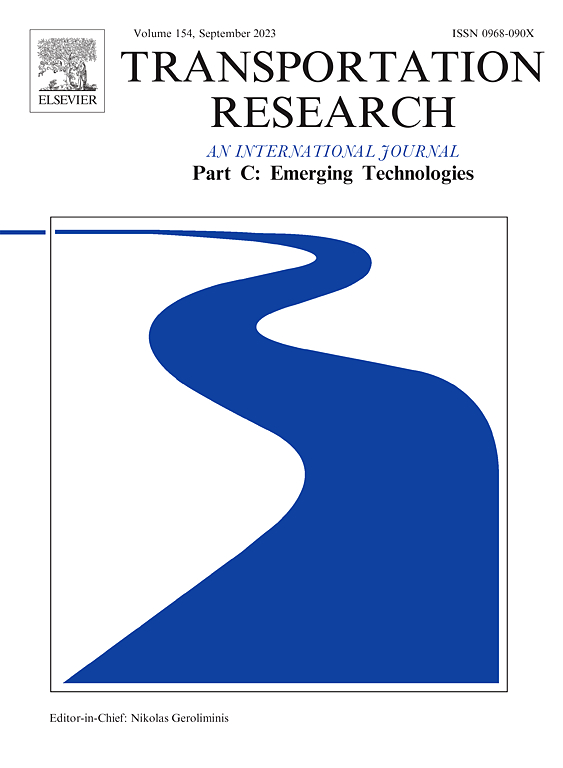城市轨道交通网络中的个体响应预测和个性化引导策略优化
IF 7.6
1区 工程技术
Q1 TRANSPORTATION SCIENCE & TECHNOLOGY
Transportation Research Part C-Emerging Technologies
Pub Date : 2024-10-07
DOI:10.1016/j.trc.2024.104875
引用次数: 0
摘要
先进的旅行信息系统在缓解城市轨道交通全网拥堵方面发挥着至关重要的作用。然而,现有的研究忽视了乘客对信息遵从的异质性及其个性化需求,导致引导效率低下。针对这些局限性,本文探讨了个性化引导问题。本文提出了一个综合框架,为乘客提供策略性的差异化路线建议,最终实现系统成本最小化。该框架包括两个模块,第一个模块预测信息下的个人路线决策。乘客偏好被纳入梯度提升决策树模型,以捕捉遵守信息的异质性。此外,该模块还将自动票价收集数据与陈述偏好数据整合在一起,从而避免了大规模、高成本的数据收集工作。第二个模块提出并解决个性化引导问题。该问题被建模为一个马尔可夫决策过程,包含一个广阔的求解空间。此外,还利用深度确定性策略梯度方法来克服问题的动态性和维度灾难。我们提供了一个北京地铁的案例研究,以突出所提框架的有效性。研究结果表明,通过引导乘客前往不那么拥挤的区域,该引导策略大大降低了全网的广义旅行成本,降幅达 18.7%,在过度拥挤区域的收益也相当可观。此外,所提出的框架还能准确预测个人在路线选择中的行为反应,将均方误差至少降低了 18.5%。这项研究为地铁管理者有效组织客流、提高乘客出行质量提供了宝贵信息。本文章由计算机程序翻译,如有差异,请以英文原文为准。
Individual response prediction and personalized guidance strategy optimization in urban rail transit networks
Advanced travel information systems play a crucial role in alleviating network-wide congestion in urban rail transit. However, existing studies overlook the heterogeneity of passengers’ compliance with information and their personalized requirements, leading to inefficiencies in guidance. To address these limitations, this paper explores the personalized guidance problem. An integrated framework is proposed to strategically provide passengers with differential route suggestions, ultimately minimizing systematic cost. The framework includes two modules, the first of which predicts individual route decisions under information. Passenger preferences are incorporated into the gradient boosting decision tree model to capture the heterogeneity of compliance with information. Additionally, this module integrates automated fare collection data with stated preference data, thereby avoiding the large-scale and costly data collection. The second module formulates and solves the personalized guidance problem. The problem is modeled as a Markov decision process encompassing an extensive solution space. Moreover, the deep deterministic policy gradient approach is utilized to overcome the dynamicity and dimensional disaster of the problem. A case study of the Beijing Subway is provided to highlight the effectiveness of the proposed framework. The findings show that the guidance strategy significantly decreases the network-wide generalized travel cost by 18.7%, with considerable benefits in overcrowded regions by guiding passengers toward less crowded areas. Moreover, the proposed framework accurately predicts individual behavior responses in route choice, reducing the mean squared error by at least 18.5 %. This study offers valuable information for subway managers to effectively organize passenger flow and improve the quality of passenger travel.
求助全文
通过发布文献求助,成功后即可免费获取论文全文。
去求助
来源期刊
CiteScore
15.80
自引率
12.00%
发文量
332
审稿时长
64 days
期刊介绍:
Transportation Research: Part C (TR_C) is dedicated to showcasing high-quality, scholarly research that delves into the development, applications, and implications of transportation systems and emerging technologies. Our focus lies not solely on individual technologies, but rather on their broader implications for the planning, design, operation, control, maintenance, and rehabilitation of transportation systems, services, and components. In essence, the intellectual core of the journal revolves around the transportation aspect rather than the technology itself. We actively encourage the integration of quantitative methods from diverse fields such as operations research, control systems, complex networks, computer science, and artificial intelligence. Join us in exploring the intersection of transportation systems and emerging technologies to drive innovation and progress in the field.

 求助内容:
求助内容: 应助结果提醒方式:
应助结果提醒方式:


